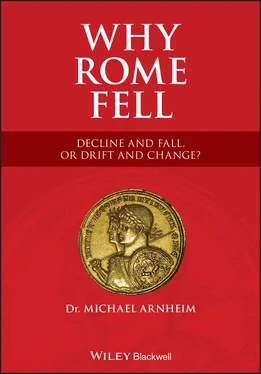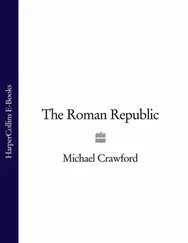Michael Arnheim - Why Rome Fell
Здесь есть возможность читать онлайн «Michael Arnheim - Why Rome Fell» — ознакомительный отрывок электронной книги совершенно бесплатно, а после прочтения отрывка купить полную версию. В некоторых случаях можно слушать аудио, скачать через торрент в формате fb2 и присутствует краткое содержание. Жанр: unrecognised, на английском языке. Описание произведения, (предисловие) а так же отзывы посетителей доступны на портале библиотеки ЛибКат.
- Название:Why Rome Fell
- Автор:
- Жанр:
- Год:неизвестен
- ISBN:нет данных
- Рейтинг книги:3 / 5. Голосов: 1
-
Избранное:Добавить в избранное
- Отзывы:
-
Ваша оценка:
- 60
- 1
- 2
- 3
- 4
- 5
Why Rome Fell: краткое содержание, описание и аннотация
Предлагаем к чтению аннотацию, описание, краткое содержание или предисловие (зависит от того, что написал сам автор книги «Why Rome Fell»). Если вы не нашли необходимую информацию о книге — напишите в комментариях, мы постараемся отыскать её.
Why Rome Fell: Decline and Fall, or Drift and Change?
Why Rome Fell
Why Rome Fell
Why Rome Fell — читать онлайн ознакомительный отрывок
Ниже представлен текст книги, разбитый по страницам. Система сохранения места последней прочитанной страницы, позволяет с удобством читать онлайн бесплатно книгу «Why Rome Fell», без необходимости каждый раз заново искать на чём Вы остановились. Поставьте закладку, и сможете в любой момент перейти на страницу, на которой закончили чтение.
Интервал:
Закладка:
Beik’s error is compounded in his conclusion: “Absolutism was the political manifestation of a system of domination protecting the interests of a privileged class of officers and landed lords. Strong bonds linked the provincial nobility, the episcopacy, the various corps of royal officers, and the town oligarchies to the crown and to each other.” (Beik, loc. 4449.) “What sort of absolutism is suggested by these findings?” asks Beik, regarding this as almost a rhetorical question. The correct answer, though, is “No kind of absolutism.” For, far from being a picture of absolutism, this is actually a representation of some sort of shared government, a hybrid between monarchy and oligarchy, which is decidedly not a description of the reign of the “Sun King.”
In analyzing power relations or power structures, one really should be a little more careful with terms like “absolutism,” used by Beik throughout or “autocracy,” Brown’s preferred alternative to it. “Autocrat” and “autocracy” are from the Greek, meaning “ruling on one’s own,” or “a monarch of uncontrolled authority; an absolute, irresponsible governor; one who rules with undisputed sway.” (OED.) “Absolutism” has a very similar meaning. Coming from ab+solutus , from the Latin verb absolvo , it means literally (to free from, exempt, dispense from), as in Ulpian’s famous description of imperial power, Princeps legibus solutus est ( Dig . 1.3.31), which is discussed below. In short, therefore, both autocracy and absolutism refer to a form of monarchy with total power. Despite his famous (and arguably misinterpreted) remark, L’état, c’est moi (I am the state), Louis XIV’s position was not one of total power, but it was also a far cry from a hybrid between monarchy and aristocracy. (See Chapter 6.)
Was Diocletian an Autocrat?
This brings us back to the fundamental question: Was monarchical power under Diocletian and the tetrarchy more autocratic than imperial power under the Principate? As mentioned above, unlike Augustus, Diocletian was not in the least bit bashful about revealing his power. Indeed, on the contrary, he revelled in displaying it. Gone was Augustus’s demure, even modest demeanor, replaced by pomp and bombast although, as we have seen, a number of Augustus’s successors had already blazed a trail toward the ostentation of the Dominate. We have the valuable insider view of the Emperor Julian, who was not taken in by the play-acting of either Augustus or Diocletian. And neither was Gibbon, from his very different vantage point. In sum, Diocletian’s actual power was probably not much greater, if at all, than that of Augustus three centuries earlier.
The real difference between these two great rulers was in their perception of threats to their position. Augustus’s elaborate charade was undoubtedly prompted by his concern not to meet the same fate as his adoptive father assassinated by a small band of aristocrats. Hence, he eschewed titles like “king” and “dictator” redolent of one-man rule while, at the same time, he fostered his inherited popularity with the masses, who shared none of the aristocracy’s republican sensibilities but actually wanted a strong ruler to champion their cause.
Diocletian had nothing but scorn and disdain for the senatorial aristocracy, which he demonstrated by essentially removing them from practically all positions of power. They had already been largely sidelined by successive emperors, so Diocletian had nothing to fear from them. And, as for the plebs urbana , the common people of Rome, he did nothing to court them either. He hardly ever set foot in Rome, which he clearly regarded as the capital of the Empire in name only. He came to power through the army, and any threat to his position would come from that quarter. Enough of his predecessors over the past century had been overthrown by military force. Hence his close attention to the army, which not only protected his position as emperor but also shored up the integrity of the empire. So, although Diocletian’s power may not have been any greater than that of Augustus, his power-base was very different.
Princeps Legibus Solutus Est
The reforms of Diocletian (r. 284–305) are generally lumped together with those of Constantine (r. 306–337). This is partly because of the scarcity of contemporary evidence of Diocletian’s reign and partly because there undoubtedly was a certain common thread running through both reigns though there was also one very major difference starting in the latter part of Constantine’s reign, as we shall see in Chapter 3. On the other hand, as we have already seen, some of the innovations attributed to Diocletian can be traced back to earlier emperors.
The great Roman jurist Ulpian (c. 170–228) summed up the emperor’s law-making powers in the formula: Quod principi placuit legis habet vigorem (What pleases the emperor has the force of law). ( Dig . I.4.1.) Any doubt about the scope of imperial power in this regard is dispelled by Ulpian’s even more laconic and sweeping pronouncement: Princeps legibus solutus est (The emperor is not bound by the laws) ( Dig . 1.3.31). Taken literally, this must mean that the emperor is above the law and, therefore, an absolute monarch. It has to be remembered that Ulpian’s opinions had no official status until they were incorporated into the Digest as part of the Corpus Juris Civilis (Body of Civil Law) by the Emperor Justinian in the year 533. Yet Ulpian’s dicta were written between 211 and 222 under the Severan dynasty, with reference to his own day, and they were not entirely theoretical. Ulpian himself served as Praetorian Prefect and chief adviser to the Emperor Severus Alexander (r. 222–235), which cost him his life at the hands of the praetorian guard, whose privileges he had reduced.
Ulpian’s contemporary, Cassius Dio, (c. 155–c. 235), confirmed that the emperor was “absolved from the laws,” and that this position could be traced back to the earliest days of the Principate. (Dio 53.18.1.) The Lex de Imperio Vespasiani (law concerning the constitutional powers of Vespasian”), dating from the year 69, confers upon the emperor a rather less comprehensive exemption from the operation of the laws, limiting it to the laws from which Augustus, Tiberius and Claudius had been exempted. However, this important document, only about half of which has survived on a bronze plaque, also contains a clause (number VI) conferring on Vespasian (r. 69–79) the right and power to do and execute “…whatever he shall consider to be in accordance with the public interest and the dignity of divine and human, public and private interests,” just like Augustus, Tiberius, and Claudius. ( CIL VI. 930 = ILS 244.) The less than pellucid language of this clause has aroused great controversy. What exactly is the scope of the power described here? Taken literally and in isolation, it would appear to confer on Vespasian an all-encompassing power. However, this is restricted by the clause about the emperor’s dispensation from the laws, which exempts him only from those laws from which Augustus, Tiberius, and Claudius had been exempted. And even Clause VI makes it clear that Vespasian is not being granted any more power than had already been possessed by Augustus, Tiberius, and Claudius. There is a negative subtext here, as only the “good” emperors are cited as precedents, while the names of Gaius Caligula, Nero, Galba, Otho, and Vitellius are all studiously omitted. So, Vespasian is possibly being warned here not to assume any powers that the “bad” emperors may have arrogated to themselves. On the other hand, the broad powers conferred by Clause VI are far more extensive than the constitutional position depicted in Augustus’s Res Gestae , discussed in Chapter 1. Although that document is a work of propaganda, the reason for the inclusion of Augustus’s name in the Lex de Imperio may also have an ulterior motive, possibly to attribute to the revered founder of the regime novel powers being conferred on Vespasian.
Читать дальшеИнтервал:
Закладка:
Похожие книги на «Why Rome Fell»
Представляем Вашему вниманию похожие книги на «Why Rome Fell» списком для выбора. Мы отобрали схожую по названию и смыслу литературу в надежде предоставить читателям больше вариантов отыскать новые, интересные, ещё непрочитанные произведения.
Обсуждение, отзывы о книге «Why Rome Fell» и просто собственные мнения читателей. Оставьте ваши комментарии, напишите, что Вы думаете о произведении, его смысле или главных героях. Укажите что конкретно понравилось, а что нет, и почему Вы так считаете.












